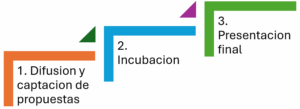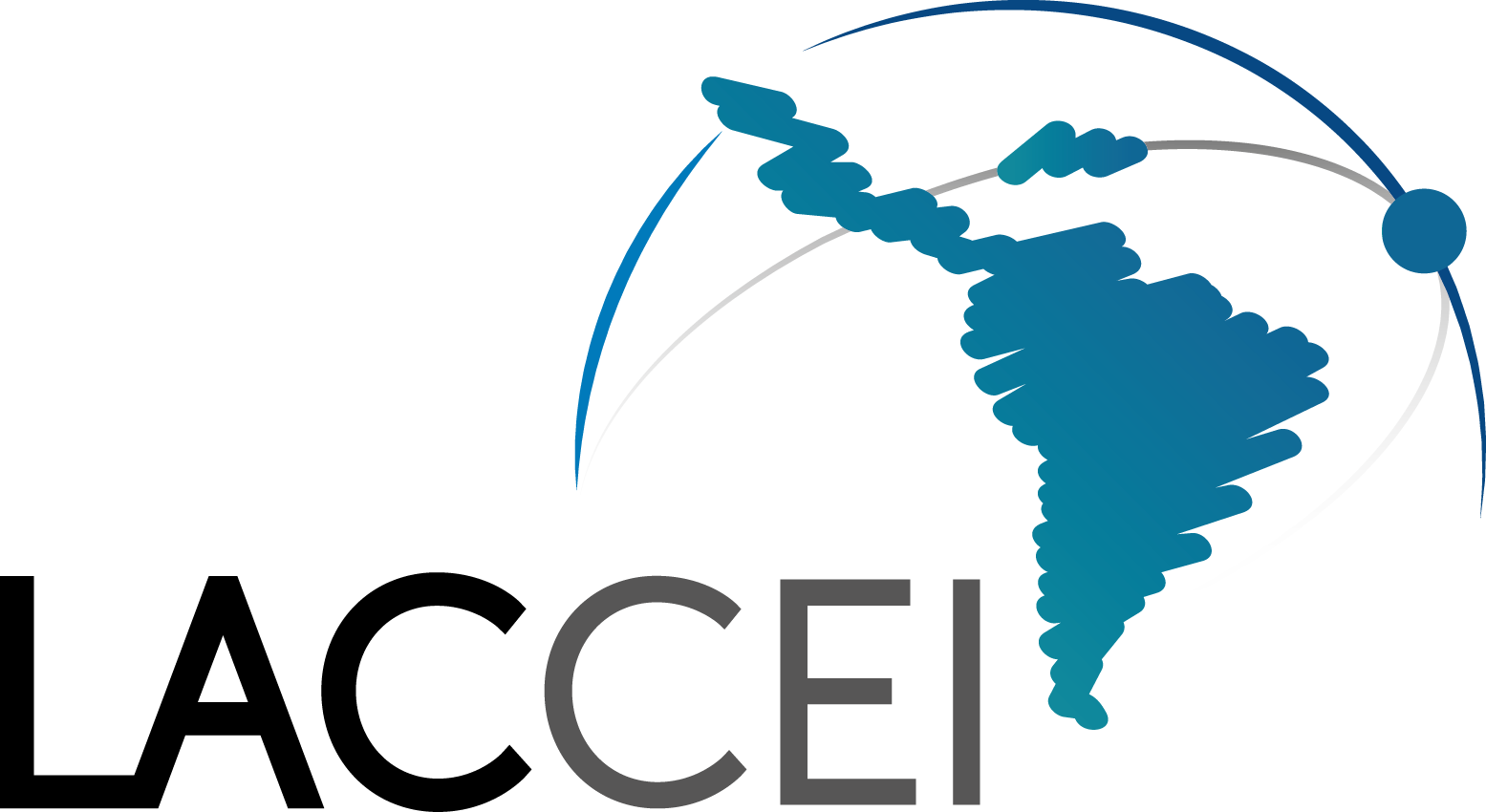Para español, click AQUI
Entrepreneurship and Innovation Student Competition (E&I25)Deadline for first phase: July 15th
Deadline to submit project (Phase 1): August 22, 2025
The LACCEI “Student Entrepreneurship and Innovation Project Competition” program features a model designed to help innovative young students bring their new projects, products, and/or services to market quickly. This is achieved through a process that supports participants throughout the entire development cycle, providing tools such as training, mentorship, expert guidance, access to funding, office space, and testing environments—either simulated or real.
The model, initially applied in the context of the “LACCEI Student Entrepreneurship and Innovation Project Competition,” seeks to promote entrepreneurship and innovation among university students with the goal of achieving the following objectives:
- Foster an Entrepreneurial and Innovative Culture
- Develop Key Skills
- Promote Innovation and Value Creation
- Connect and Create Opportunities
- Enrich the Academic Environment
To accomplish this, the program includes the following thematic tracks, outlining the pathway of 21st-century entrepreneurship:
1. SMART CITIES
Projects and initiatives that address current urban challenges, improving the daily lives of citizens through disruptive technologies such as cloud connectivity, the Internet of Things (IoT), cybersecurity, last-mile logistics, mobility, and more.
2. E-HEALTH AND SPORTSTECH
Projects and initiatives that provide innovative solutions in the healthcare sector—from patient care to health administration—and/or technology-driven solutions for effective training.
This may include mobile applications, wearables, medical devices, or the presentation of new methodologies and scientific research.
3. SUSTAINABILITY AND CIRCULAR ECONOMY
Projects and initiatives aimed at reducing negative environmental impact through balanced use of natural resources. These efforts prioritize energy savings and the use of renewable and non-renewable materials with the potential to transform waste into valuable raw materials. Sustainability and circular economy strategies also support the development of solutions in high-consumption sectors such as gastronomy, textiles, and public services.
4. EDUCATION
Projects and initiatives that promote education through EdTech (Educational Technology), both in academic and practical settings, offering solutions across the entire educational value chain: students, schools, methodologies, classroom experiences, inclusion, and more.
5. FINTECH AND INSURTECH
Projects and initiatives focused on delivering financial and insurance sector services or products through new technologies. These solutions help users carry out electronic payments more efficiently, invest in stock markets, manage finances, compare insurance or banking products, save money, or consume responsibly, among other innovations.
6. RETAIL, TOURISM, AND HOSPITALITY
Projects and initiatives driving the digital transformation of the retail sector, fostering innovation among large retailers, and boosting the tourism industry (travel, hotels, restaurants, and entertainment) through innovation in products, services, production or logistics processes, improving the customer and purchasing experience, increasing personalization, accessibility, and sustainability.
7. GENDER, ENTREPRENEURSHIP, AND INNOVATION
Projects and initiatives that encourage reflection on the gender inequalities that persist in our society, especially in the fields of science and technology. Despite progress, women continue to face significant barriers and remain underrepresented in scientific and technological fields. These initiatives aim to offer innovative products that take gender perspectives into account, contributing to social transformation.
These seven thematic tracks serve as a reference point for participating teams to guide their projects toward addressing current needs and developing innovative ventures in sectors that are key to improving quality of life.
The E&I25 Competition consists of three phases:
- Phase 1: Participants must submit a project using a web form. The top 15 projects will be selected to move on to Phase 2. Project submission template.
- Phase 2: A 12-week pre-incubation process (September, October, and November).
- Phase 3: Teams must submit a summary document of their progress during the pre-incubation process, a 3- to 5-minute pitch video of their solution, and present to the jury during the (virtual) session at LEIRD 2025.

RULES
PARTICIPANTS: Teams of four or five active undergraduate students from different disciplines or majors are eligible. Gender equity within teams is encouraged. Each team must be supported by a mentor who is a professor at the institution where the team leader is enrolled.
TYPES OF PROJECTS (Phase 1): Any innovative entrepreneurial project can be submitted, including those with environmental, social, or community impact. Projects must address at least two or three Sustainable Development Goals (SDGs). Projects must be submitted through the web form and must include the project file using this template: [click here].
WRITTEN REPORT AND VIDEO (Phase 2): Projects must be presented in English or Spanish through two components: a written report and a video. Evaluation will take place in October and November for the top 10 projects selected during Phase 1 in September. The jury will evaluate both the video and the written project.
PRESENTATION (Phase 3): On Tuesday, December 2, during LEIRD 2025, the jury will conduct live Q&A sessions and review presentations to select the winners.
THE JURY
A group of professors and/or entrepreneurs appointed by the LACCEI Committee for Innovation and Entrepreneurship (CIPEI).
MENTORS
Mentors will receive official certificates during LEIRD 2025. They may obtain up to three different certificates:
- One for each student project they mentored,
- Another for each project approved in the first phase, and
- A third if any of their projects rank among the top three winners.
AWARDS
For the top three projects:
- First Place: USD 500 for the team and free virtual registrations to attend LEIRD 2025. Optionally, the team may receive specialized mentorship from CIPEI members to further develop their entrepreneurial initiative.
- Second Place: USD 300 for the team and free virtual registrations to attend LEIRD 2025. Optionally, the team may receive specialized mentorship from CIPEI members.
- Third Place: USD 200 for the team and free virtual registrations to attend LEIRD 2025. Optionally, the team may receive specialized mentorship from CIPEI members.
All selected teams (only 10) that advance to Phase 2 and the institutions they represent will receive a certificate of recognition. The incubation process will be carried out by CIPEI and the Creativity and Innovation Lab “El Patio” at UTB.
EVALUATION CRITERIA
- Problem or need: 20%
- Solution: 15%
- Innovation: 20%
- Impact: 20%
- Feasibility: 15%
- Overall evaluation: 10%
To view the full description of each criterion, please click here.
2025 CALENDAR
Deadline to submit project (Phase 1): July 15, 2025- Extended deadline to submit project (Phase 1): August 22, 2025
- Announcement of evaluations (Phase 1): August 25, 2025
- Selection of the top 15 projects
- Pre-incubation process for the top 15 (Phase 2): September 1 to November 28, 2025
- Submission of pre-incubation report and pitch video (Phase 3): December 2, 2025
- Final presentations: December 2, 2025
Important Documents
- Official competition guidelines:
- Web form for project submission (Phase 1):
- Template for project submission:

